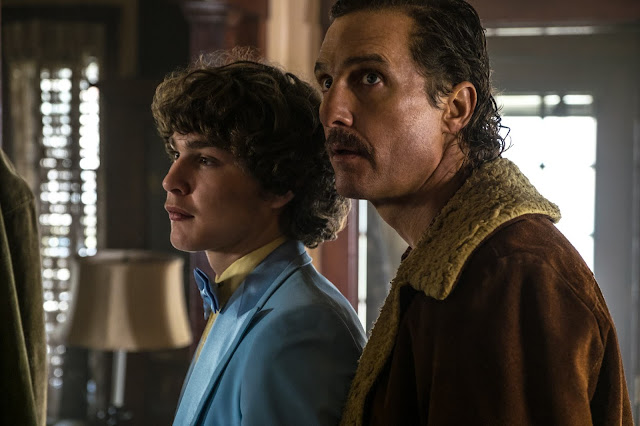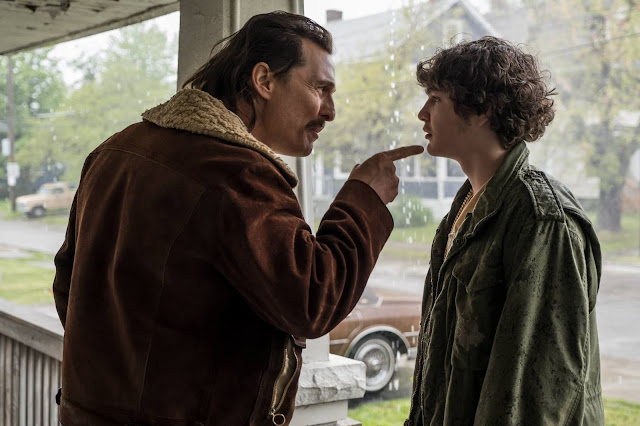While you can never judge a film by its trailer, it's not hard to imagine some viewers being a bit perplexed when they walk out of Yann Demange's White Boy Rick. After all, didn't that energetic, vibrant, "I Feel Love"-set trailer promise a rise-and-fall saga with the potential to become a new crime classic? There was gusto and panache in that first clip, and while seeing it in front of every movie for three months got annoying, the combination of true crime mayhem and a unique Matthew McConaughey performance should have been enough to intrigue any viewer.
But that slick charisma has vanished from the final product, nowhere to be found. The spark of life is practically non-existent; it's the antithesis of that frenetic trailer. So what's left?
In reality, the unbelievable tale of "White Boy" Rick Wershe Jr.'s escapades in the underbelly of 1980s Detroit is still violent and wild and occasionally amusing. At the same time, it's also an extraordinarily downbeat, pensive, and class-conscious film about miserable people in a miserable place where the only outcome is more misery. Did I mention that Demange goes heavy on the misery? If the goal was to constantly convey the Wershe family's dire situation, well, mission accomplished. And I mean that in a somewhat serious way; there's no shortage of effective moments that touched my emotions. But as a crime drama, this true story is as flat as they come, hopelessly devoid of momentum from its opening frame to its final burst of aching sadness.
Our story begins in 1984 at a Detroit gun show, where Richard Wershe Sr. (McConaughey) and his son, the eponymous "White Boy" Rick (Richie Merritt), are shopping for some firearms to sell themselves. They're both savvy hustlers, but the elder Wershe can't hold a candle to his son. We see Rick talk down the price on fabricated AKs, using his knowledge against a gun seller who is totally unprepared for a fight with a teenager. Welcome to Rick's world, where lying and hustling is just part of everyday life. The Wershe family lives in a house in downtown Detroit, which means their life is obviously far from perfect. Rick's sister (Bel Powley) suffers from addiction, while his grandparents (Bruce Dern and Piper Laurie) live across the street in an equally grimy old house.
And that's only the start of the Wershe family's troubles. Richard Sr. is under FBI investigation for illegal firearm usage, and a pair of manipulative agents (Jennifer Jason Leigh and Rory Cochrane) plead with him to be an informant on local drug activity in the neighborhood. He refuses, so they go after his son instead. In the hopes of keeping his dad out of jail, Rick helps the agents identify prominent dealers and criminal power players in the area. He makes a little coin on the side and his dad stays out of jail, so it's a win for everyone. But as Rick descends further into the criminal underworld, the teenager makes powerful enemies, enemies who could come back to haunt him. As the walls close in and the danger intensifies, it's increasingly unclear if he'll escape this life unscathed.
This is very much a bare-bones synopsis, covering just the first act of the film. There is no shortage of drama in White Boy Rick, which almost has the feeling of a miniseries that just happened to be condensed into a single two hour movie. Demange and screenwriters Andy Weiss, Logan Miller, and Noah Miller cover so much ground over the course of this story, jumping from year to year and introducing new characters and subplots at virtually every critical juncture.
If you were looking at this as a positive, you could say that the film is never boring. At the same time, White Boy Rick is so jam-packed with characters and narrative strands that Demange is never able to sustain any real energy. The film is scattered and only intermittently successful, struggling under the weight of one-note villains and a story that casts its net far too wide. Even Rick, as played by newcomer Richie Merritt, fails to stand out as a complex, dynamic character. The film is introspective enough to lean into an element of class struggle for Rick, this yearning for social mobility captured with sensitivity by Demange's camera. At the same time, Merritt's performance feels hollow and inconsistent, a whole lot of bravado with little to show for it.
Crime films always have a tendency to bite off more than they can chew, but what interests me most about White Boy Rick is Demange's impulses as a filmmaker. Even if the characters range from mildly sympathetic to totally empty, the French director captures this story in strange, contradictory, and occasionally thrilling ways. Firstly, Demange shoots Detroit like he's filming a horror movie, which feels somewhat appropriate given the time period. The barrenness of the downtown landscapes, the snow that makes everything look dark, the eerie emptiness of the streets at night- Demange succeeds at capturing a distinct and cohesive mood. Simultaneously, the film oscillates between contemplative minimalism and disco-fueled chaos, presenting these jarring contradictions in regards to Rick's home and gangster lives.
It's an approach that mostly works, at least until it doesn't. Demange's thoughtful treatment of a tragic story is unusual and compelling, existing as the opposite of what most Hollywood filmmakers would do in this scenario. Sadly, this examination of class and crime is in service of a story that just never clicks, meandering and sputtering before it finally arrives at a moving, heartbreaking conclusion. And in a way, the methodical rendition of what could be an exciting story only serves to highlight the messiness of the whole affair. White Boy Rick has a lot on its mind, but the final product is a bit of a slog.
THE FINAL GRADE: C+ (5.7/10)
Images courtesy of Sony
But that slick charisma has vanished from the final product, nowhere to be found. The spark of life is practically non-existent; it's the antithesis of that frenetic trailer. So what's left?
In reality, the unbelievable tale of "White Boy" Rick Wershe Jr.'s escapades in the underbelly of 1980s Detroit is still violent and wild and occasionally amusing. At the same time, it's also an extraordinarily downbeat, pensive, and class-conscious film about miserable people in a miserable place where the only outcome is more misery. Did I mention that Demange goes heavy on the misery? If the goal was to constantly convey the Wershe family's dire situation, well, mission accomplished. And I mean that in a somewhat serious way; there's no shortage of effective moments that touched my emotions. But as a crime drama, this true story is as flat as they come, hopelessly devoid of momentum from its opening frame to its final burst of aching sadness.
Our story begins in 1984 at a Detroit gun show, where Richard Wershe Sr. (McConaughey) and his son, the eponymous "White Boy" Rick (Richie Merritt), are shopping for some firearms to sell themselves. They're both savvy hustlers, but the elder Wershe can't hold a candle to his son. We see Rick talk down the price on fabricated AKs, using his knowledge against a gun seller who is totally unprepared for a fight with a teenager. Welcome to Rick's world, where lying and hustling is just part of everyday life. The Wershe family lives in a house in downtown Detroit, which means their life is obviously far from perfect. Rick's sister (Bel Powley) suffers from addiction, while his grandparents (Bruce Dern and Piper Laurie) live across the street in an equally grimy old house.
And that's only the start of the Wershe family's troubles. Richard Sr. is under FBI investigation for illegal firearm usage, and a pair of manipulative agents (Jennifer Jason Leigh and Rory Cochrane) plead with him to be an informant on local drug activity in the neighborhood. He refuses, so they go after his son instead. In the hopes of keeping his dad out of jail, Rick helps the agents identify prominent dealers and criminal power players in the area. He makes a little coin on the side and his dad stays out of jail, so it's a win for everyone. But as Rick descends further into the criminal underworld, the teenager makes powerful enemies, enemies who could come back to haunt him. As the walls close in and the danger intensifies, it's increasingly unclear if he'll escape this life unscathed.
This is very much a bare-bones synopsis, covering just the first act of the film. There is no shortage of drama in White Boy Rick, which almost has the feeling of a miniseries that just happened to be condensed into a single two hour movie. Demange and screenwriters Andy Weiss, Logan Miller, and Noah Miller cover so much ground over the course of this story, jumping from year to year and introducing new characters and subplots at virtually every critical juncture.
If you were looking at this as a positive, you could say that the film is never boring. At the same time, White Boy Rick is so jam-packed with characters and narrative strands that Demange is never able to sustain any real energy. The film is scattered and only intermittently successful, struggling under the weight of one-note villains and a story that casts its net far too wide. Even Rick, as played by newcomer Richie Merritt, fails to stand out as a complex, dynamic character. The film is introspective enough to lean into an element of class struggle for Rick, this yearning for social mobility captured with sensitivity by Demange's camera. At the same time, Merritt's performance feels hollow and inconsistent, a whole lot of bravado with little to show for it.
Crime films always have a tendency to bite off more than they can chew, but what interests me most about White Boy Rick is Demange's impulses as a filmmaker. Even if the characters range from mildly sympathetic to totally empty, the French director captures this story in strange, contradictory, and occasionally thrilling ways. Firstly, Demange shoots Detroit like he's filming a horror movie, which feels somewhat appropriate given the time period. The barrenness of the downtown landscapes, the snow that makes everything look dark, the eerie emptiness of the streets at night- Demange succeeds at capturing a distinct and cohesive mood. Simultaneously, the film oscillates between contemplative minimalism and disco-fueled chaos, presenting these jarring contradictions in regards to Rick's home and gangster lives.
It's an approach that mostly works, at least until it doesn't. Demange's thoughtful treatment of a tragic story is unusual and compelling, existing as the opposite of what most Hollywood filmmakers would do in this scenario. Sadly, this examination of class and crime is in service of a story that just never clicks, meandering and sputtering before it finally arrives at a moving, heartbreaking conclusion. And in a way, the methodical rendition of what could be an exciting story only serves to highlight the messiness of the whole affair. White Boy Rick has a lot on its mind, but the final product is a bit of a slog.
THE FINAL GRADE: C+ (5.7/10)
Images courtesy of Sony




Comments
Post a Comment